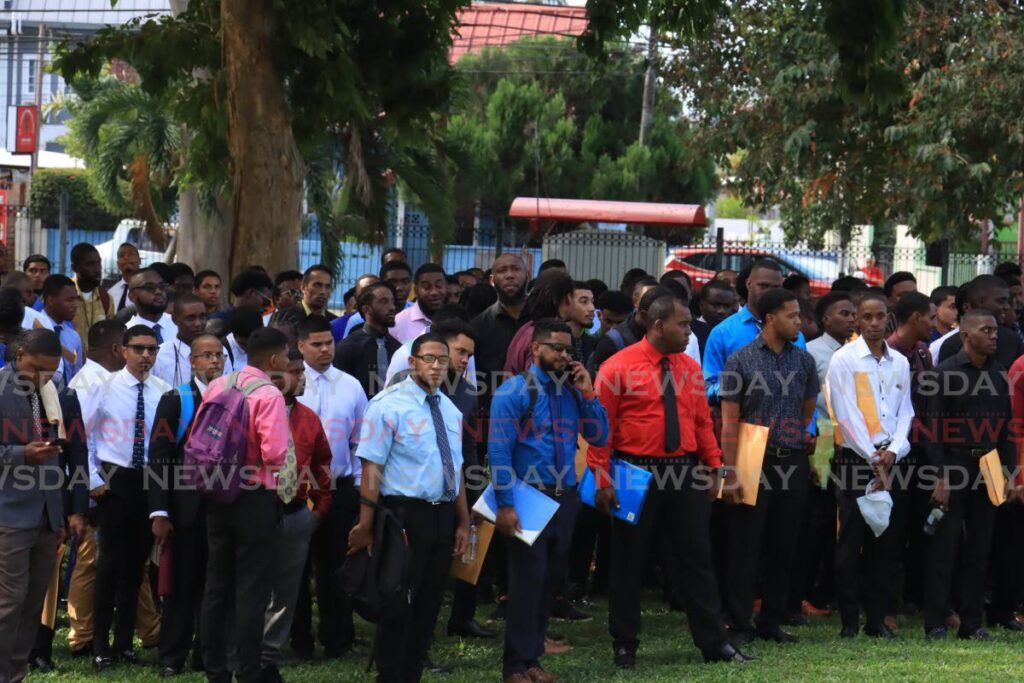Recruiting today for tomorrow's needs

ONE of the most critical skills in a human-resource management practice is knowing how to interview for successful recruitment.
Recruitment today is not recruitment for today.
If the objective is to fulfil the strategic plan – drawn up for successively five to ten years and further on, based on the succession plan of a team, commercial, military, constabulary, educational or service organisation – the interview taking place must identify in the interviewee, not just what certificates they bring to the table, but their potential skills, abilities, attitudes and motivations, for the successive growth and development positions they will be able to fill in the future.
You don’t recruit to fill today’s needs but tomorrow’s.
One of the most critical social and political concerns in Trinidad and Tobago is the escalation of crime to the point where no one even commented on an editorial in a leading newspaper that was headed: A threatened criminal takeover of the State. There was no public outcry. It is like commenting on potholes on the road. Everybody knows it, fears it and lives with it. The only response was headlines in the following days about 3,000 people turning up to apply for positions in the TTPS – a crisis response if there ever was one.
In the many years over which I professionally carried out interviews for clients, particularly clients needing to recruit men and women in positions of responsibility, those to be placed in jobs overseeing the security of other persons, property and premises, never took less than 30 minutes. Senior ones for at least 60 minutes.
Every applicant had to go through a process called “due diligence.” Qualifications were checked, and body language and attitudes were watched and listened to.
For the more senior positions, professional psychometric tests were carried out by certified testers, and results sent abroad for double security to avoid bias, favouritism and gang involvement.
During the process, one male applicant was not asked to return for a second interview when it was discovered, upon making the standard phone contact to check his academic qualifications, that he did not have the master’s degree he claimed to have from a Canadian university. He subsequently turned up with a very senior job in the Ministry of National Security. When a job advertisement attracts hundreds of applicants, sloppy recruiters may not bother to check qualifications. Sometimes they don’t even bother with an interview, assuming that reading a resume will suffice. In that case, the recruiter hadn’t interviewed the applicant, trusting that a well-crafted resume was honest. It wasn’t.
In an environment where survey after survey reveals that members of the public do not trust police officers, calling a majority of them inadequately trained, or worse still, corrupt, it is essential that these precautions are taken for the sake of the reputation of the police service. This ensures that whoever they recruit, has the competency and ability, or at least the trainability, to protect us adequately.
What about the questions asked when the gang of four went into the busy Long Circular Mall where there are multiple security cameras on every floor? They shot a gym owner midday, then casually returned to their vehicle and escaped into heavy Friday traffic? There are only four directions a car can go upon exiting Long Circular Mall – north, south, east and west – every direction having police or an army post within a couple of blocks, but no security officers came rushing out to capture anyone. At least none were reported. Surely apprehending criminals should have been an essential part of their basic training? Or is that not part of what their duties are? There only are four directions they could have taken. And could midday traffic not prevent a speedy retreat? Wouldn’t the licence plates show up in the security cameras? And then there are the prisons.
Are the plaintive cries of the Prison Officers Association, complaining of the dehumanisation of the policy of taking prisoners’ cell phones away from them, at all related to the "protection rackets" being run by the capos from inside the prisons via their cell phones? Threatening vendors by the bridge and small entrepreneurs by the junction with death unless they hand over $500 a month, or now, we are warned $500 a week? Is it that the victims can’t identify the extortionists to the police? Or perhaps the police don’t have their home addresses so can’t find them? It is a big country, I guess, It is a funny old world.


Comments
"Recruiting today for tomorrow’s needs"